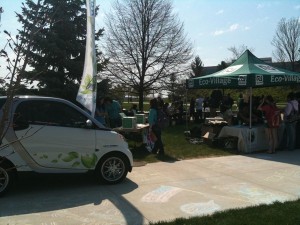Guest Blog Post:
The Many Benefits of Foam Recycling
Commonly referred to as Styrofoam, a trademark of Dow Chemical, foam #6 is also known as polystyrene foam, expanded polystyrene, EPS, and foam. Since its light weight helps reduce shipping costs and its excellent cushioning properties result in less breakage, foam #6 is widely used to protect electronics during shipping. Similarly, it is the material of choice for egg cartons, fast food take-out containers, foam plates, and foam cups because it is lightweight, insulates well (maintains temperature), and is inexpensive. Another benefit of this material is that it is recyclable.
In fact, foam #6 is a thermoplastic, so it is technically recyclable over and over again. So why isn’t it being accepted in many community recycling programs? There are several reasons. First, it is not a significant portion of the waste stream. All foam #6 represents less than one percent of all products generated, by weight, in municipal solid waste.[1] Second, waste diversion goals are typically measured by weight, so the lightweight of foam makes it unattractive (a truckload of loose foam only weighs ~1,000 lbs). Third, it takes more effort to collect a pound of foam than a pound of glass or cardboard.
So why should we recycle foam? First, foam has real value once it has been compacted. There are now many markets for foam and the price they pay often exceeds the price of cardboard and other popular recycling commodities.
Second, new technology has made recycling foam much more efficient than in the past. For example, there are now many options for special compactors, called densifiers, that will compact foam to as much as an 85:1 ratio. This enables 40,000 lbs of material to fit on a 48’ trailer. The equipment also requires less space than in the past and it is able to efficiently process mixed densities of foam at the same time. Plus, it does all of this while minimizing the amount of labor foam recycling may have taken in the past.
And third, the conversion of foam into new products is a simple process that reduces the need to harvest crude oil from the earth and all of the energy associated with the process required to make virgin resin. The end result is that we realize a reduction in greenhouse gasses and lessen our dependence on foreign oil. Reclaimers simply place the compacted material into a grinder, which feeds an extruder. The extruder is similar to a Play-Doh machine in that the ground material goes into the machine, melts, and comes out the other end like spaghetti. The spaghetti is then cooled and chopped into small pieces (pellets). Once it is in the form of pellets, it then can be used to make useful new products.
Because of these reasons, efforts continue to be made to expand the capabilities to recycle foam. There are companies, like Dart Container, working to make foam recycling more accessible to more people. They have even created positions within their business solely focused on generating new foam recycling programs across the country.
And much progress has been made. In 2007, only one city in California participated in a curbside recycling program. Fast-forward to today, and you’ll find curbside Styrofoam recycling centers in over 65 California communities – when the population of these communities is added together, it is more than 20 percent of the state!
More and more residents are gaining additional foam recycling options. For instance, there are a number of drop-off locations and collection and shipping programs for those who use large amounts of foam like quick service restaurants, and college campuses. Even school districts are getting involved by collecting students’ foam lunch trays for recycling.
All of these programs demonstrate a growing trend of recycling programs that has resulted in reductions in landfills and a more sustainable environment for all of us. We encourage everyone to get involved in recycling foam. To find out where foam can be recycled near you, or to see if your neighborhood participates in a foam recycling program, check www.1800recycling.com, www.earth911.com or http://www.dart.biz/recycle to see if you’re living in, or near a community with a curbside recycling or foam drop-off program.
[1] Municipal Solid Waste in the United States 2008 Facts and Figures, U.S. Environmental Protection Agency, November 2009








